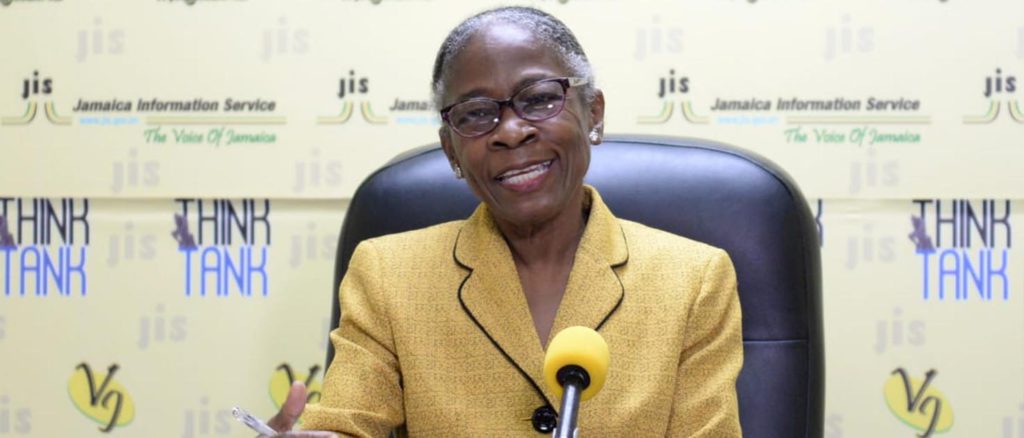There is a plan to assign a mentor to every adolescent mother who enrolls at the Women’s Centre of Jamaica Foundation (WCJF).
The WCJF, a division of the Ministry of Culture, Gender, Entertainment and Sport, was established in 1978 to provide continuing education for girls who drop out of school due to pregnancy.
The plan is one of the recommendations coming out of a recent two-month survey on the impact of the COVID-19 pandemic on adolescent mothers registered at the centres. The survey was focused on the emotional health of adolescent mothers, the extent of family support, their sexual and reproductive health needs, their education and other concerns related to COVID-19.

Director of Field Operations, Women’s Centre of Jamaica Foundation, Beverley Martin Berry 
Executive Director of the Women’s Centre of Jamaica Foundation, Dr Zoe Simpson, makes a point at a recent Jamaica Information Service (JIS) Think Tank.
About 388 adolescent mothers enrolled at the sites across the island were interviewed by 20 counsellors during the period May 15 to June 17, 2020. Funding for the training of the counsellors was provided by the Government of Jamaica, the United Nations Children’s Fund, the European Union and Fight for Peace.
Speaking at a recent Jamaica Information Service (JIS) ‘Think Tank’, Executive Director of the WCJF, Dr Zoe Simpson, said the strategy is to recruit more mentors so that every girl could be assigned one, once she joins the programme. Currently, she said that only a percentage of the girls who are reintegrated into the formal school system are assigned mentors.
Dr. Simpson said the survey also brought into focus the need for ongoing financial support for the girls.
Minister of Culture, Gender, Entertainment and Sport, Hon. Olivia Grange, had arranged for the girls to receive “dignity kits” containing packages of personal-care items, food and baby supplies since they were no longer receiving support from the centres, which were closed. However, at the time of the survey, the need for additional supplies was expressed by the girls.
The survey revealed that 39.2 per cent of the girls reported that they were managing reasonably well. However, 39.2 per cent disclosed that “there was little or no food at home because their parents/breadwinners had lost their jobs as a result of COVID-19”.
The Executive Director said the Foundation is committed to providing the girls with life skills, such as “how to navigate challenges, problem-solving and prioritising.”
She said that emphasis will also be placed on skills, such as decision-making, perseverance, assertiveness, communication skills, critical and creative thinking.
“So, you only have a pound of cornmeal; what are you going to do to survive, you and your child? The point is, they must not lie down and die; they must find a way to survive, and be resilient,” she added.
Simpson also said the WCJF is to rethink the delivery of the education programme.
“So, as much as we had virtual classes for grade-11 girls, now virtual classes have to be extended to all grades as young as we get them – grade six and grade seven” .
Dr. Simpson said it is pivotal for adolescent mothers to be provided with contraceptive methods to delay second pregnancies and “to keep the rate of adolescent pregnancy below the level that it is”.
She added that the mandate of the WCJF is to delay second pregnancies until education and career goals are achieved.
Director of Field Operations, WCJF, Beverley Martin-Berry, who also spoke at the Think Tank, said that adolescent mothers continue to access sexual and reproductive health services during the pandemic.
“We were elated when we recognised that 72.6 per cent of the registered mothers with us were on a contraceptive method and not a short-term method, but a long-term method… so the use of the contraceptive method would have been useful in delaying a second pregnancy, especially in the pandemic climate,” she pointed out.
Mrs. Berry said that the fear of contracting the coronavirus prevented some of the girls from accessing health services.




